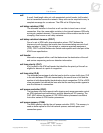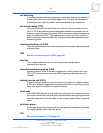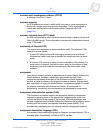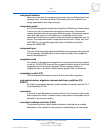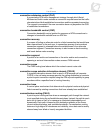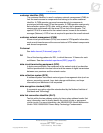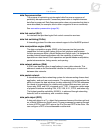
- 33 -
List of terms
Nortel Multiservice Switch 7400/15000/20000
Terminology
NN10600-005 7.2S1 Standard
PCR7.2 and up March 2006
Copyright © 2006, Nortel Nortel Confidential
connection admission control (CAC)
A preventative ATM traffic management strategy through which Nortel
Multiservice Switch nodes evaluate a connection request based on the traffic
characteristics of both established connections and the requested connection.
The request is accepted if the new connection does not jeopardize the QOS
of established connections.
connection bandwidth control (CBC)
Connection bandwidth control guides the response of ATM connections to
changes in bandwidth available over an ATM link.
connection recovery
A process of finding an alternate route for a failed connection that would have
been cleared back to the end-user. In connection recovery, the incumbent
connection segment is released before the establishment of an alternate
connection segment. Connection recovery is also known as hard rerouting
and break-before-make rerouting.
connection segment
A portion of an end-to-end connection or the entire end-to-end connection,
spanning a series of intermediate nodes across a PNNI network.
connection scope
The PNNI routing level above which the network cannot route calls.
connection scope selection information element (CSS-IE)
A signaled information element that is used in ATM anycast call requests.
CSS-IE in the call setup message permits the calling endstation to constrain
a point-to-point connection request using the ATM anycast capability to group
members within a specified level of routing hierarchy.
connection trace
A control plane mechanism that determines the physical nodes and physical
links traversed by existing connections that have already been established.
connectionless routing (CNLS)
A point-to-point routing service where a message’s path through the network
is not specified during the call establishment phase. Instead, the path for each
data unit (a frame or cell) of a message is calculated independently and
dynamically. Each path is based on the destination address of the frame,
current network topology, and available bandwidth. Connectionless routing
features a high degree of robustness and reliability, since data can be easily
steered away from failed or heavily congested facilities.




